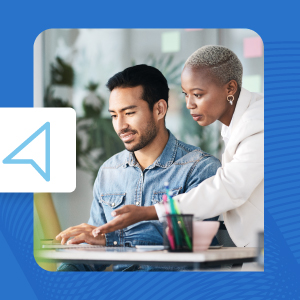In this era of rapid technological advancement, embracing digital transformation is not just a matter of convenience, but a necessity for ensuring government agencies can effectively serve their constituents. The convergence of policy directives, like the President Management Agenda and the 21st Century IDEA (Integrated Digital Experience Act), with the pioneering spirit of public servants, sets the stage for a new era of government-citizen interaction.
Personalized Government Experiences
As we reflect on the lessons learned over the last few years, it becomes clear that the digital shift was not just about replicating existing services in a virtual space, it was about reimagining the very essence of citizen engagement itself. Agencies pivoted swiftly, using technology to supply critical services while safeguarding public health. This showed the immense potential for innovation within the public sector. The digitization of vital services, from health updates to unemployment assistance, was a monumental first step. Now, agencies stand at the precipice of a new frontier: personalization. Imagine a government service experience that predicts and addresses the unique needs of each individual. It is not just a matter of efficiency; it is a statement of commitment to inclusivity.
 Accessibility, often considered a compliance requirement, is at the core of this transformation. Yet, true accessibility encompasses more than technical compliance. It demands a cultural shift towards empathy and understanding. It calls for dedicated teams to champion accessibility at every stage of service delivery. It challenges agencies to view every interaction as an opportunity to forge a deeper connection with citizens.
Accessibility, often considered a compliance requirement, is at the core of this transformation. Yet, true accessibility encompasses more than technical compliance. It demands a cultural shift towards empathy and understanding. It calls for dedicated teams to champion accessibility at every stage of service delivery. It challenges agencies to view every interaction as an opportunity to forge a deeper connection with citizens.
Looking ahead, the potential for government-citizen interactions is boundless. The fusion of technological innovation and policy imperatives opens a realm of possibilities. From predictive analytics that anticipate citizen needs to virtual assistants that guide individuals through complex processes, the future is bright with potential. In this quest for personalized government experiences, creating tailored content emerges as a pivotal strategy. This involves understanding the diverse needs and preferences of citizens and crafting information that resonates with them on a personal level. By using data analytics and user insights, agencies can quickly and automatically curate content that addresses specific challenges, provides relevant information, and guides individuals seamlessly through their interactions with government services.
Digital Workforce
Furthermore, the power of personalization extends beyond citizens to the dedicated employees within government agencies. A digitally empowered workforce is fundamental to delivering exceptional public services. Agencies can invest in training and upskilling programs, equipping employees with the digital tools and knowledge necessary to navigate the evolving landscape. By fostering a culture of continuous learning and innovation, agencies empower their teams to adapt to changing citizen needs and drive meaningful impact. Empowering employees goes hand-in-hand with enhancing the experiences of constituents. By streamlining internal processes and using technology, agencies can reduce bureaucratic hurdles and deliver services more efficiently. This not only improves the speed of service delivery but also frees up resources to focus on initiatives that truly matter to citizens.
Seeking feedback from both employees and constituents is instrumental in fine-tuning government services. Establishing open channels of communication allows agencies to gain valuable insights into pain points, preferences, and areas for improvement. This iterative approach fosters a culture of responsiveness, ensuring that government services evolve in tandem with the evolving needs of the community.
A Citizen-Centric Government for All
The pursuit of personalized government experiences is a multifaceted endeavor. It requires a comprehensive approach that encompasses the creation of tailored content, the empowerment of employees, and a relentless commitment to continuous improvement of these experiences. As agencies embark on this transformative journey, they not only meet the immediate needs of citizens but also set the stage for a more agile, responsive, and citizen-centric government in the years to come.
Overall, the journey towards personalized government-citizen experiences is not just a matter of policy compliance, but a testament to the ideals of a government that serves all its citizens equitably. By championing accessibility, agencies pave the way for a more inclusive society. By embracing personalization, they empower individuals to engage with their government on their own terms. Together, we embark on a transformative journey towards a more responsive, inclusive, and citizen-centric government.
Check out this four-part Adobe webinar series to learn more about creating simplified government experiences customers can count on.







